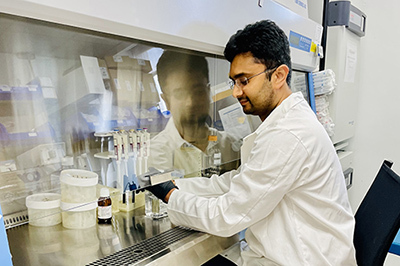Ever on the lookout for new ways to improve the fermentation of corn sugars into ethanol fuel, Agricultural Research Service (ARS) scientists have devised an approach for using genetically modified baker’s yeast to prevent a top cause of costly ethanol plant shutdowns—namely, contamination by unwelcome bacteria.
Source: USDA Agricultural Research Service (Photo: Courtesy)
Scientists modified the yeast’s genetic makeup with “coding” to make an enzyme on its outer surface that kills or inhibits the growth of the bacteria—microbial rivals whose release of acetic and lactic acids can keep the fermentation process from achieving its peak ethanol production capacity.
“These bacteria are found everywhere in the environment, especially on plant material. They are actually responsible for the fermentation of vegetables to make products like sauerkraut and pickles,” explained Shao-Yeh Lu, a research microbiologist with ARS’ National Center for Agricultural Utilization Research in Peoria, Illinois. “Unfortunately, the acetic acid and lactic acid produced by these same bacteria in a bioethanol fermentation facility will cause stress and inhibit the growth of the baker’s yeast (Saccharomyces cerevisiae), which is responsible for the production of ethanol.”
Ethanol is considered a cleaner-burning alternative to fossil fuels such as gasoline because its greenhouse gas emissions are 40 percent lower, by some estimates. Unlike fossil fuels, ethanol can be derived from renewable resources, namely, plant-based sources of sugar (e.g., corn) and cellulosic fiber (e.g., miscanthus grass). Estimates vary, but there are between 187 and 198 ethanol biorefinery plants nationwide with a total production capacity of more than 17 billion gallons annually. However, meeting the demand for renewable fuels such as ethanol necessitates that the systems in place for producing them be as efficient as possible.
Bacteria that infiltrate these fermentation systems primarily feed on glucose sugars in the corn mash—the same ones the yeast helps convert into ethanol. However, this bacterial “bullying” can diminish the yeast’s conversion of glucose into ethanol by an estimated 16 to 42 percent. In biorefinery plants, this can necessitate a shutdown for cleaning and the use of antibiotics to kill the bacteria at an approximate cost of $4.5 million annually in lost revenues for a facility with a 100-million-gallons-per-year capacity.
“Current methods for eliminating bacterial contaminants in bioethanol production heavily rely on the prophylactic use of antibiotics,” Lu said. “However, this approach is not sustainable in the long term, as prolonged antibiotic use can lead to the development of antibiotic-resistant bacteria.”
So, Lu and colleagues decided to even the microbial playing field.
They did this by modifying a baker’s yeast strain with a gene they discovered for making endolysin, a specialized enzyme that kills the bacteria on contact.
In lab-scale trials, use of the endolysin-making yeasts reduced the presence of the bacteria by 85 percent compared to a control group of the yeasts that hadn’t been genetically modified. On average, this reduced acetic and lactic acid levels in the mash by as much as 40 percent and 71 percent, respectively. Ethanol production increased by as much as 40 percent.
According to Lu, modifying yeast to produce endolysin—either on their surface or secreted—is likely to be more cost-effective than adding bulk amounts of the enzyme to contaminated corn mash. Additional research is needed to fully ascertain its potential commercial use, but if validated through larger-scale trials, the endolysin-wielding yeasts could offer an alternative to antibiotics or other costly chemical cleansers.
Lu published a paper detailing the advance in Frontiers in Bioengineering and Biotechnology together with co-authors Siqing Liu, Kristina Glenzinski and Christopher Skory—all with the ARS Center in Peoria—and Maulik Patel, with the Oak Ridge Institute for Science and Education (ORISE) in Oak Ridge, Tennessee.





